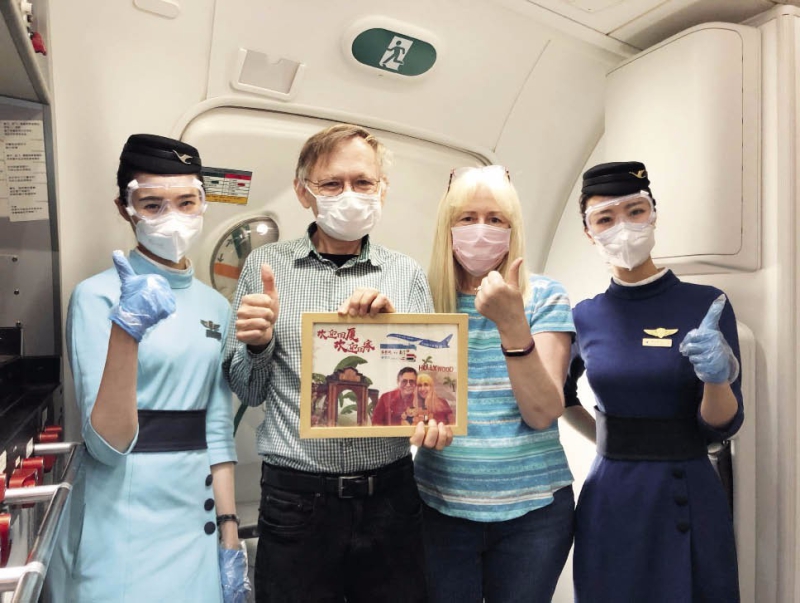___________

“Democracy” or Coronavirus?
Recently, I overheard an American ask his friend, “Did you quit shaking hands because of the virus?” “No,” he replied, “I quit because everyone is out of toilet paper.” I’m glad that American people still have a sense of humor at a time like this! But what is not funny, is that some of the wealthiest nations not only lack toilet paper, but also still don’t have virus test kits even more than 10 weeks after China shared the virus’ genome with the world. Why are these nations so unprepared?
Even a little logic should have suggested the virus would spread globally, but they not only didn’t prepare but also went to great lengths to explain why their “democracies” could not take China’s lead. Western media have reported how China’s draconian measures such as quarantines and restrictions on travel deprived people of their basic rights of freedom of movement. But fast-forwarding to an epidemic that is now a pandemic, governments are falling over themselves to take many of China’s preventative measures.
Places like San Francisco are of course careful to avoid the word “quarantine,” which violates people’s inalienable right of movement, but they ordered people to “shelter in place,” which may sound less restrictive and more “democratic.” However, it sounds to me that the wording is still restricting people’s movement — and these restrictions are needed, so why pretend they are not?
The only logical reason that nations could spend months criticizing China while doing nothing themselves, is that they naively felt they were in no danger. This is understandable, given our immersion today in an artificial world of social media. We are bombarded daily with so much negative news that tragedies happening afar are no more real than a reality TV show or a movie.
It also seems that people living in comfort in the wealthier nations have a sense of entitlement, and believe that their wealth will continue to shield them from a distant virus, just as for decades their wealth and militaries have insulated them from the wars, crimes and political unrest that kill tens of millions each year in poor nations. As former U.S. President George W. Bush once declared, “Nothing will change our American way of life!” But it appears the coronavirus never got Bush’s message.
In 1990, I thought it ironic that a Japanese strategist, Kenichi Ohmae, would write a book entitled, The Borderless World. He claimed that trade was open and free for all nations. Even today, trade is not borderless, and probably never will be — but the coronavirus truly knows no borders. Rich and poor alike fall before it — though the elderly, the weak and the poor are hardest hit.
Protect the Right to Life and Seize the Day!
Fortunately, for the world, while the West protected people’s “rights” by doing nothing, China acted immediately, without excuse or apology or mincing words, to protect people’s most fundamental right – the right to life. China already began testing a vaccine and has promised that, if successful, they will share it freely with the world.
And even as the Chinese government resolutely sacrificed its economy to tackle the problem head-on, the Chinese people also rose to the occasion and cooperated because, quite frankly, they understand their mortality. Chinese value comfort and convenience as much as any other people, but they remember all too vividly the poverty and sickness that haunted their nation only decades earlier. Chinese agree with their government that if they lose that most fundamental right of life, all other rights are useless. And to preserve that most precious gift of life, Chinese have always been able to tighten their belts and endure hardship like no other people in history.
And if you understand the spirit of China through the ages, then you will also understand how and why the world’s most populous nation today dared to tackle and defeat this pandemic head-on.
One hundred and sixty years ago, a missionary named Robert Samuel Maclay wrote in his book Life Among the Chinese: With Characteristic Sketches and Incidents of Missionary Operations and Prospects in China about the eternal China, “It is a noteworthy fact that of all those ancient empires founded immediately subsequent to the Deluge, China alone remains. The Assyrians, Egyptians, and, in later times, the Grecians, all attained to a comparatively high degree of intelligence and refinement; but their star soon culminated and sank into utter darkness. China, however, has never been wrecked, her civilization has never retrograded; paradoxical though it seems, her star has remained in its zenith for at least three thousand years. Through all this long lapse of centuries the Chinese have kept up, fairly and steadily, to their original civilization; and today they present all the essential elements of those social, literary, and political traits which characterized them in those early epochs when the Assyrians built their magnificent cities, the Egyptians developed their subtle theory of the metempsychosis, or the Greeks were thundering at the gates of Troy.”
Chinese today, like their ancestors, embrace life — and just as importantly, they embrace life with those they love, and this is why Confucian society over the ages has been built on family and relationships.
Dying people around the world have been asked what they most regret in life, and they never lament that they did not make more millions or spend more time in the office. Consistently, their greatest regret is that they did not spend enough quality time with the people they loved.
So, if you’ve survived the coronavirus, celebrate life and “seize the day!” But when you seize life, don’t let go of those you love because life is too short to not live fully.
___________
WILLIAM N. BROWN is a professor at the Xiamen University MBA Center and academic director of its OneMBA program.